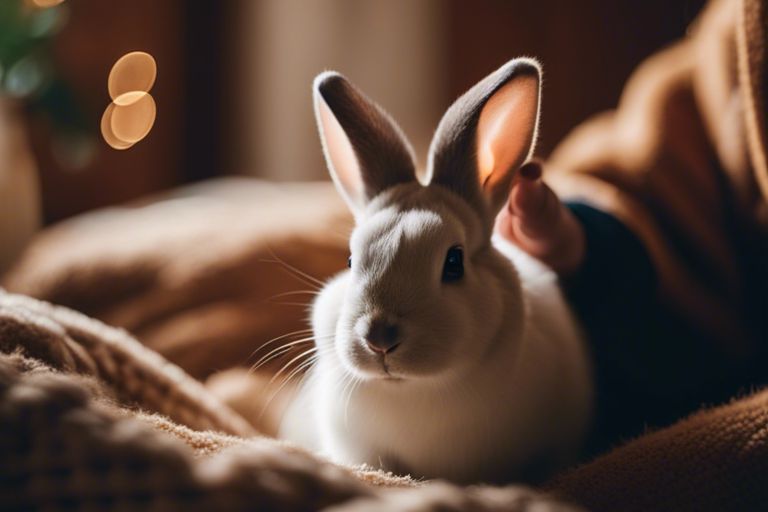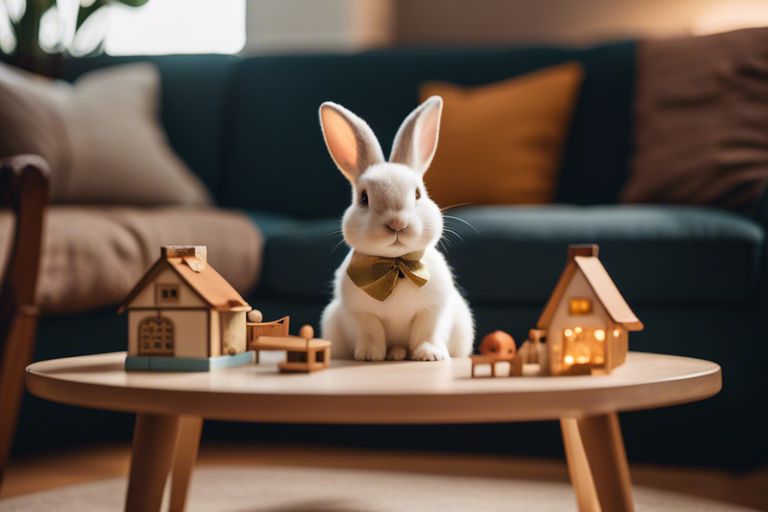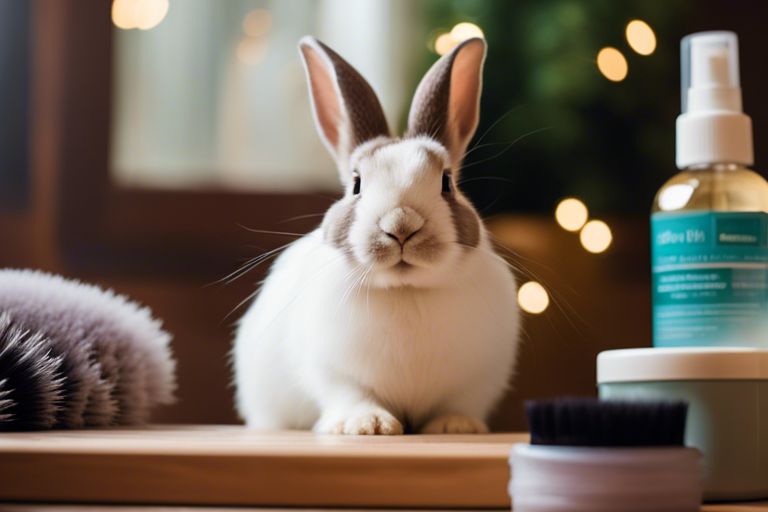Bonding with your rabbit is crucial to developing a strong and lasting relationship with your furry friend. Rabbits are social animals that thrive on companionship and connection with their human caregivers. By taking the time to bond with your rabbit, you can create a trusting and loving relationship that will benefit both you and your pet.
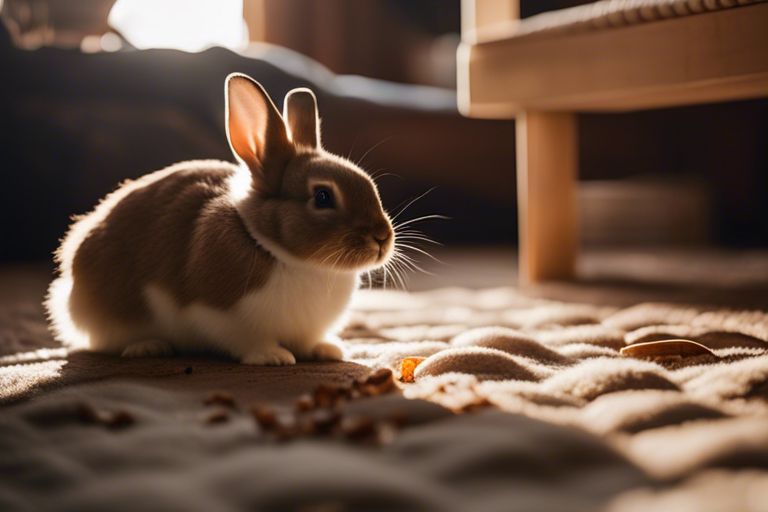
Preparing Your Home for a Rabbit
Creating a Safe Space
There’s nothing more important than creating a safe and secure space for your rabbit to thrive in. Before bringing your bunny home, set up a designated area where they can roam freely without any danger. This space should be free of any harmful materials, wires, or small objects that your rabbit could chew on and potentially swallow.
Rabbit-Proofing Your Home
Rabbits are curious creatures and love to explore their surroundings. Rabbit-proofing your home is vital to ensure your bunny’s safety and prevent any accidents. Make sure to secure loose cords, block off small spaces where your rabbit could get stuck, and remove any toxic plants that may be within reach. Additionally, investing in some chew toys and providing plenty of hay can help deter your rabbit from chewing on furniture or other items in your home.
Avoid leaving any hazardous substances within reach of your rabbit, such as cleaning products or medications. Always supervise your rabbit while they are exploring their environment to prevent any mishaps.
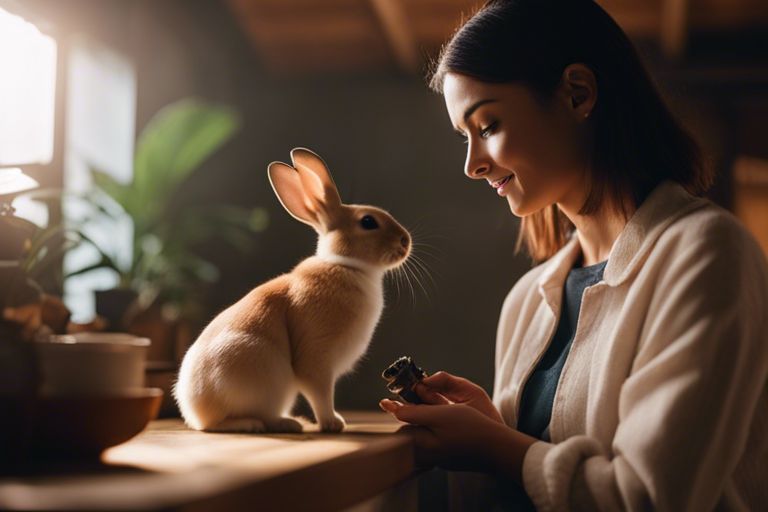
The First Days Together
How to Approach Your Rabbit
For the first few days with your new rabbit, it’s crucial to approach them in a calm and gentle manner. Rabbits are prey animals, so sudden movements or loud noises can startle them. To build a strong relationship with your rabbit, sit near their enclosure and speak softly to them. Allow your rabbit to approach you on their own terms, as forcing interaction may cause them to become fearful. Patience is key in these early days as your rabbit gets acclimated to their new environment.
Establishing Trust
Days 1-7 are crucial for establishing trust with your new rabbit. Spend time near them, offering treats and gentle pets to help them associate you with positive experiences. Avoid sudden movements or hovering over your rabbit, as this can be perceived as threatening. Building trust takes time, so be consistent in your interactions and allow your rabbit to initiate contact. Remember to respect your rabbit’s boundaries and give them space when needed.
Understanding your rabbit’s body language is vital in building trust. Pay attention to their ears, eyes, and body posture to gauge their comfort level. By learning to interpret your rabbit’s signals, you can better understand their needs and build a strong bond based on trust and mutual respect.
Handling and Touch
Once again, handling and touch play a crucial role in building a strong bond with your rabbit. It is necessary to approach these interactions with care and respect to ensure a positive and trusting relationship with your furry companion.
Proper Handling Techniques
The way you handle your rabbit can have a significant impact on how they perceive you. When picking up your rabbit, always support their hindquarters to prevent any injuries or discomfort. Cradle them gently against your body, ensuring they feel secure and stable in your grasp. Avoid sudden movements or loud noises that can startle your rabbit. By handling them calmly and confidently, you will help them feel safe and at ease in your presence.
Recognizing and Respecting Your Rabbit’s Boundaries
There’s no one-size-fits-all approach when it comes to handling rabbits. Each rabbit has its own personality and comfort level when it comes to touch and interaction. It’s crucial to observe your rabbit’s body language and signals to understand their preferences and boundaries. Some rabbits may enjoy being petted on their head and ears, while others may prefer gentle strokes on their back. By respecting your rabbit’s boundaries and not forcing interactions, you will build trust and strengthen your bond over time.
Rabbits are prey animals by nature and can be sensitive to sudden movements or loud noises. It’s important to approach them calmly and patiently, allowing them to initiate contact at their own pace. By creating a safe and comfortable environment for your rabbit, you will help them feel more secure and willing to engage in bonding activities with you.
Communication and Body Language
For a successful bond with your rabbit, it is crucial to understand their communication signals and body language. Rabbits are intelligent creatures that rely heavily on non-verbal cues to express themselves and interact with their environment. By learning to interpret your rabbit’s signals and noises, you can better understand their needs and strengthen your bond.
Learning Rabbit Signals and Noises
Even though rabbits may not speak our language, they communicate through a variety of signals and noises. From thumping their hind feet to indicate danger or distress to soft tooth purring when they are content, each signal conveys a different message. By paying attention to your rabbit’s body language and the sounds they make, you can start to decipher their emotions and respond accordingly.
Responding Appropriately to Your Rabbit’s Communication
Now, once you have learned to recognize your rabbit’s signals and noises, it is important to respond appropriately to build a strong relationship. When your rabbit nudges you for attention or runs circles around your feet, they are seeking interaction and companionship. By reciprocating their gestures with gentle pets or playtime, you are showing them that you understand and care for their needs.
Rabbits are social animals that thrive on positive interactions with their owners. By responding appropriately to your rabbit’s communication, you are not only strengthening your bond but also creating a safe and trusting environment for your furry friend to flourish.
Creating a Bonding Routine
Now that you have a rabbit in your home, it’s important to establish a bonding routine to build a strong relationship with your furry friend. Consistency is key when it comes to bonding with rabbits, as they thrive on routine and predictability. By investing time and effort into bonding with your rabbit, you can create a lasting and meaningful connection that will benefit both you and your pet.
Daily Interaction Tips
Any successful bonding routine with your rabbit involves daily interaction. Spend time each day talking to your rabbit, offering them treats, and gently petting them. Ensure that you establish trust with your rabbit by being calm and patient during these interactions. Recall, rabbits are prey animals, so they may take some time to warm up to you. Be consistent in your daily interactions and always respect your rabbit’s boundaries.
- Set aside dedicated bonding time each day to spend with your rabbit.
- Use positive reinforcement, such as treats and praise, to reward good behavior.
- Be observant of your rabbit’s body language and adjust your interactions accordingly.
Knowing your rabbit’s preferences and personality will help you tailor your interactions to suit their needs, ultimately strengthening your bond.
Playtime and Exercises
Bonding through playtime and exercises is an excellent way to build a strong relationship with your rabbit. Rabbits are curious and energetic animals that require mental and physical stimulation to stay healthy and happy. Incorporating playtime into your daily bonding routine can help your rabbit feel engaged and loved.
A variety of toys and activities can be introduced to keep your rabbit entertained and active. Bonding through playtime can also help reduce any feelings of anxiety or boredom in your rabbit, leading to a more fulfilling relationship between you and your pet.
The Role of Treats and Feeding in Bonding
Tips for Healthy Feeding
Your rabbit’s diet is crucial for their well-being and building a strong bond with them. Make sure to provide a balanced diet that includes high-quality hay, fresh vegetables, and a limited amount of pellets. Ensure your rabbit has access to fresh water at all times and monitor their food intake to prevent obesity. Additionally, avoid giving your rabbit foods that are toxic to them, such as chocolate, caffeine, or avocado.
- Offer a variety of fresh vegetables daily.
- Limit fruit and treats to small amounts occasionally.
Knowing what to feed your rabbit and how much will not only keep them healthy but also strengthen your bond as you become a trusted provider of their care.
Using Treats to Enhance the Relationship
Any interaction or training with your rabbit can be reinforced through the use of treats. Choose small, healthy treats like small pieces of vegetables or herbs to reward good behavior or as part of training sessions. This positive reinforcement will help your rabbit associate you with positive experiences and build trust in your relationship.
Using treats strategically can also help desensitize your rabbit to potentially scary situations, making them more confident around you and their environment.
Factors Affecting the Human-Rabbit Relationship
Unlike other pets, rabbits have unique personalities and behaviors that can strongly influence the bond they form with their human companions. Understanding these factors can help in building a strong and lasting relationship with your furry friend.
- Personality Differences Between Rabbits
- The Impact of Consistency and Patience
Personality Differences Between Rabbits
Between rabbits, there can be significant variations in personalities. Some rabbits may be outgoing and playful, while others are shy and reserved. It is necessary to spend time with your rabbit to understand their individual traits and preferences. By observing their behavior and responding accordingly, you can tailor your interactions to suit their needs, ultimately strengthening your bond.
The Impact of Consistency and Patience
Factors affecting the human-rabbit relationship also include the impact of consistency and patience. Rabbits are creatures of habit and thrive on routine. By maintaining a consistent environment and handling them with patience, you can help your rabbit feel secure and build trust over time. A calm and gentle approach, combined with regular interaction, can foster a deeper connection and enhance the bond between you and your rabbit. Recognizing the unique needs of rabbits and adapting your behavior accordingly is key to nurturing a strong and harmonious relationship.
Dealing With Challenges
Not every bonding experience with your rabbit will be smooth sailing. Just like any relationship, there may be obstacles to overcome. Understanding how to address these challenges will help you build a strong bond with your furry friend.
Common Behavioral Issues
For many rabbit owners, common behavioral issues such as chewing on furniture, digging in carpets, or even aggressive behavior can be frustrating. These are natural behaviors for rabbits and can be managed with patience and understanding. Providing appropriate toys for chewing and digging can help redirect your rabbit’s natural instincts. Consistent training and positive reinforcement can also help curb unwanted behaviors.
Tips for Handling Aggression or Fear
Aggression or fear in rabbits can be challenging to handle but addressing these emotions with care is crucial for a healthy bond. If your rabbit displays aggression, it may be out of fear or feeling threatened. Approaching your rabbit calmly and speaking softly can help reassure them. Avoid sudden movements and give your rabbit space if they seem scared or defensive.
- Be patient and gentle when interacting with a scared or aggressive rabbit.
- Avoid punishing your rabbit for displaying fear or aggression.
For instance, if your rabbit is exhibiting aggressive behavior, such as lunging or growling, it’s crucial to stay calm and not react with fear or frustration. Any negative reactions may escalate the situation and reinforce your rabbit’s fear.
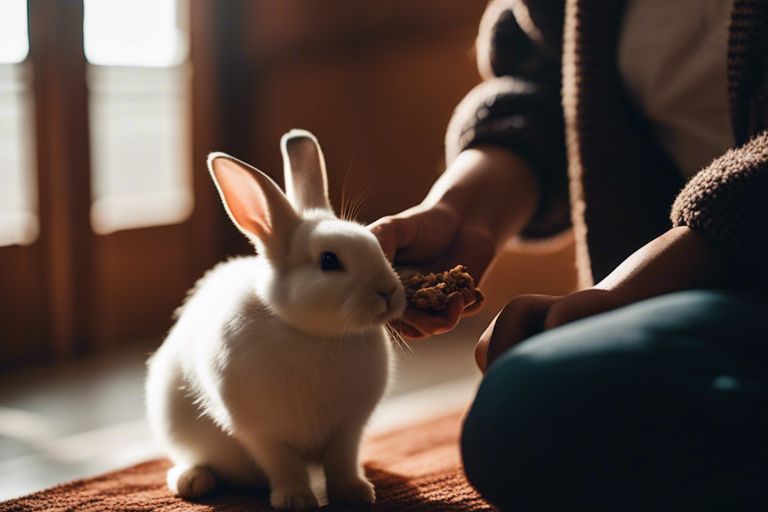
Strengthening Your Bond Over Time
Enrichment Activities
Many rabbit owners find that incorporating a variety of enrichment activities into their rabbit’s daily routine can vastly improve the bond between them. Enrichment activities can include puzzle feeders, tunnels, chew toys, and even agility courses. These activities not only stimulate your rabbit mentally and physically but also create opportunities for bonding through play and interaction.
Celebrating Milestones and Recognizing Progress
Strengthening your bond with your rabbit also involves celebrating milestones and recognizing progress along the way. Whether your rabbit has mastered a new trick, overcome a fear, or simply become more comfortable around you, taking the time to acknowledge and celebrate these achievements can go a long way in deepening your relationship. Small rewards such as favorite treats or extra playtime can reinforce positive behavior and create positive associations between you and your rabbit.
One important aspect of celebrating milestones and recognizing progress is to be patient and understanding with your rabbit. Each rabbit is unique and may progress at their own pace. By acknowledging their efforts and successes, you are reinforcing a sense of trust and security that will strengthen your bond over time.
Your consistency and commitment to your rabbit’s well-being and happiness will ultimately contribute to a strong and lasting bond between you and your furry friend. By engaging in enrichment activities and celebrating milestones, you are actively investing in the relationship and creating a foundation of trust and companionship that will continue to grow over time.
To wrap up
Following this guide on how to bond with your rabbit can help you build a strong and lasting relationship with your furry friend. By creating a safe and comfortable environment, spending quality time together, and using positive reinforcement techniques, you can establish trust and mutual respect with your rabbit.
Remember to be patient and consistent in your interactions with your rabbit, as building a strong bond takes time and effort. By understanding your rabbit’s behaviors and spending time getting to know them, you can create a loving and fulfilling relationship that will benefit both you and your bunny companion.
FAQ
Q: Why is bonding with your rabbit important?
A: Bonding with your rabbit is crucial for building trust and a strong relationship. It helps create a bond based on mutual understanding and respect, leading to a happier and healthier relationship with your pet.
Q: How can I bond with my rabbit?
A: You can bond with your rabbit by spending quality time together, offering treats, gentle petting, and speaking softly to them. Additionally, providing a safe and comfortable environment for your rabbit is important for bonding.
Q: What should I do if my rabbit is shy or fearful?
A: If your rabbit is shy or fearful, it’s important to be patient and give them space to adjust. Avoid forcing interactions and instead let your rabbit come to you at their own pace. Quietly spending time near them can help build trust over time.
Q: How can I train my rabbit to bond with me?
A: Training your rabbit to bond with you involves positive reinforcement, patience, and consistency. Use treats and gentle encouragement to reward good behavior, and spend time with your rabbit every day to strengthen your bond.
Q: What are some signs that my rabbit is bonding with me?
A: Signs that your rabbit is bonding with you include seeking out your company, grooming you, and showing curiosity and affection towards you. Your rabbit may also become more relaxed and comfortable in your presence as the bond strengthens.
